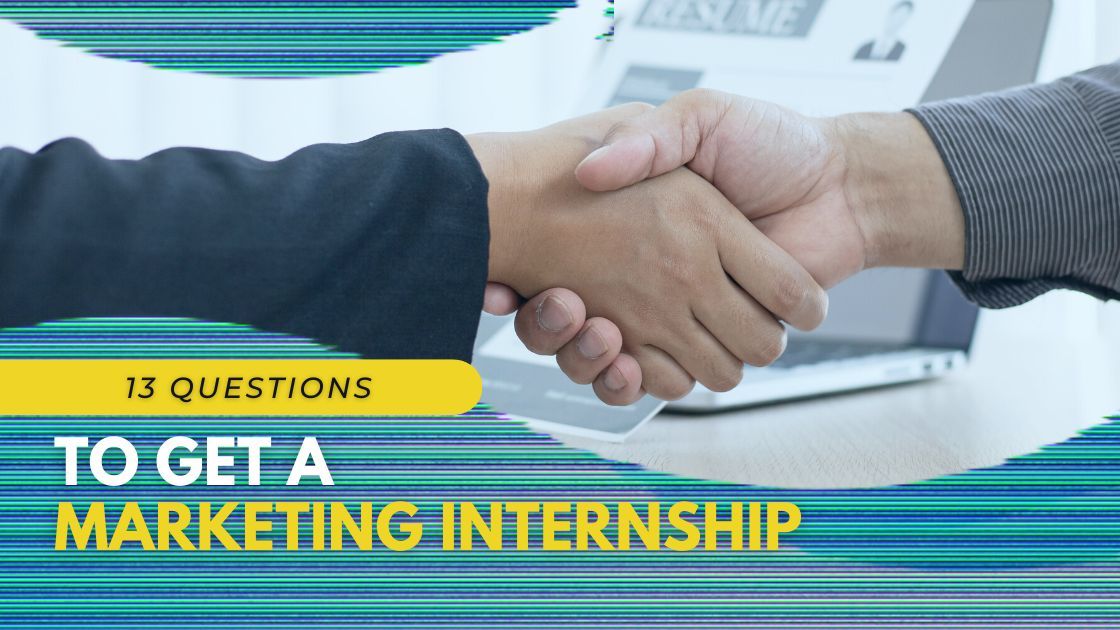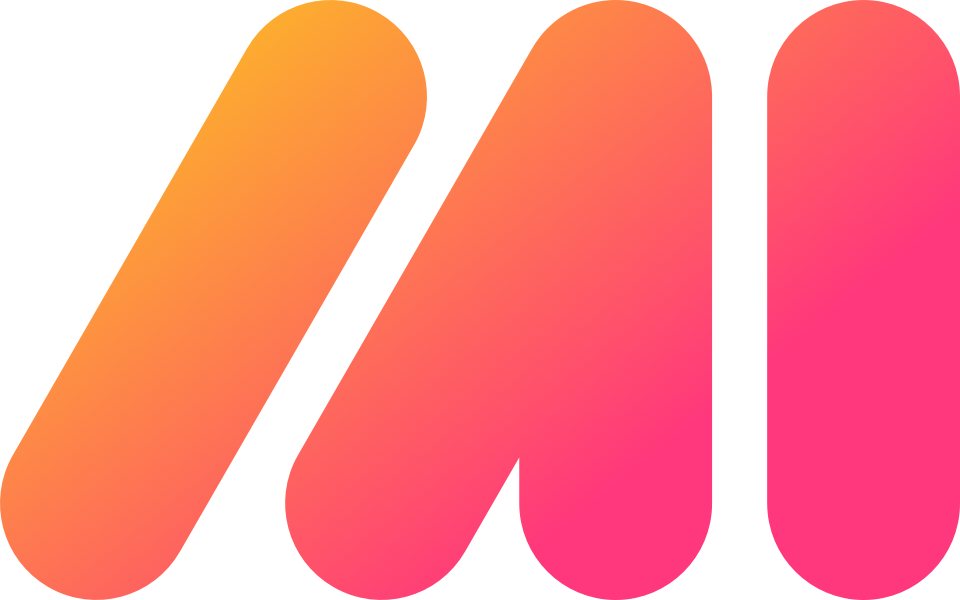Marketing internships are a great opportunity to learn from experts in the industry, and begin to understand the profession's many different sub-specialties, such as public relations, branding, and digital marketing, among others. You learn from other experts in the industry, understand how things work, and start specializing in different fields like PR, branding, digital marketing, and more.
It may come as a surprise to learn that most marketing professionals don't have a degree in marketing. According to the Career and Salary Survey, less than half of marketers reported having completed academic coursework in marketing or business, so while a college degree isn't a direct requirement, those interested in entering the field need to forge a path by gaining practical experience and understanding how the industry works.
The best way to do this is to seek out a marketing internship. Usually, these are temporary roles that companies offer students or people with zero experience early in their careers as a way to give them a boost. Interns are often required to assist in diverse marketing roles. This allows them to determine what areas they enjoy working in the most.
The responsibilities of a marketing intern might include: supporting administrative tasks, building social media campaigns, writing content for web pages and blogs, researching market trends, and even managing the company's customer relationship management (CRM) system.
Interviews are often filled with nervousness and uncertainty. You want to convince hiring managers that you're the right person for the role, but how? The easiest way is by preparing responses to a number of common questions.
(Keep in mind that an internship is not the same as a regular job. Hiring managers know you want to earn experience, so they don't expect you to know everything.)
Here are 13 common questions you might get asked during an interview for a marketing internship, complete with suggested responses. The idea is not to memorize them and then panic if you don't get asked these exact questions, but to help you create a general framework for your possible answers.
1. What Inspired You to Start a Career in Marketing?
Everyone has a story to tell.
With this question, employers want to know your story about how you got interested in marketing.
Ideally, managers want someone passionate about starting their career in the area, but they want to know the “why” behind it. So, don't be afraid of getting personal.
For example: “I went off to college to study business. While I enjoyed some of my classes, I realized the only one I truly looked forward to was marketing. It got to a point where I completely lost interest in becoming a business administrator and only wanted to know more about how to position brands and sell their products/services to their key audience. After doing a project for my marketing class that consisted of audience analysis, my professor told me he believed I had a bright future in marketing. I decided to change majors, which is probably one of the best decisions I have ever made.”
2. Could You Tell Me More About Marketing Campaigns You Felt Were Brilliant and Why?
With this question, you have the perfect opportunity to show the hiring manager you know what factors make a campaign successful.
Try to provide an in-depth analysis of why that specific campaign was brilliant. You can even go beyond highlighting the strategies you identified and how other companies can replicate them.
For example: "There are different factors to consider when evaluating a marketing campaign's success. But two of the most important ones are whether a campaign directly connects with its audience and how it can share a powerful message that resonates with that audience. Without a doubt, Dove's "Real Beauty" campaign was one of my favorites. On a personal level, it was one of the first times we saw real women instead of models. This helped to change the way beauty was perceived, and instead of promoting stereotypes like "thin means more beautiful," it promoted diversity. Dove truly understood the essence of its audience with a powerful message that told how all bodies, ethnicities, and colors are equally beautiful."
3. What is One Marketing Campaign You Consider a Complete Failure?
Along the same lines as the previous question, hiring managers also want you to be able to identify why some campaigns were complete failures. Not because you simply didn't like them but because these failures help companies and other campaigns to avoid making such mistakes.
For example: "What many companies want to do when building their marketing campaigns is search trending topics or social issues to attract customers more easily. However, in some cases, these attempts can come off as as grasping and insensitive. Capitalizing on real social issues was what made the 2017 Pepsi commercial starring Kendall Jenner a complete fiasco. The commercial was about a protest that featured the model who was watching and then decided to join the protest. Ultimately, she walks to the front of the line and hands a can of Pepsi to an officer as a peace sign. He takes it, and everyone bursts into happiness. The purpose, according to Pepsi, was to promote unity and peace, but the reaction was the opposite. The ad was completely insensitive and tone-deaf. It even appeared as a parody of the Black Lives Matter movement. Using controversial topics such as this one could have a great impact, but it needs to be better researched."
Try Markup Hero
Ready to make amazing graphics?
Start using Markup Hero to take screenshots, annotate images and PDF's and become a blogging rockstar.
Signup For Free4. What Skills Do You Have That Make You Suitable for This Role?
It's always a good idea to read the job description carefully in order to learn how to answer this question. Hiring managers want to know what you are bringing to the table. What makes you better than other candidates?
This is a great opportunity to elaborate upon some of the contents of your resume.
For example: “One of my strong skills is my ability to communicate. Not only verbally, but also in writing. I've been a volunteer for a local newspaper, where besides writing articles and interviewing people, I also help in email campaigns. This has made me gain copywriting skills that are key to enticing readers to open our emails and potentially becoming customers. Another thing that defines me is my curious nature. I'm always looking for answers and ways to improve and do things differently.”
5. What's Your Process When Given a New Project?
With this question, hiring managers want to learn about how you tackle new tasks and challenges. What's the first thing you do? Do you prioritize tasks? Are you able to complete projects with tight deadlines?
For example: “For me, the most important consideration when given a new task or project is to understand it. I read all of the available information about the project, and if something is unclear about it, I ask questions before starting to organize my tasks. When everything is cleared up, I begin to prioritize. I make a list of the most important benchmarks and set deadlines; this way, I can make sure things are taken care of in a timely manner.”
6. Do You Have Any Special Interest in a Particular Marketing Area?
“I like everything about marketing” is the worst way to answer this question. Everyone has interests; think of food, movies, or sports. It's normal to still not know for sure what you want to specialize in, but with this question, you can share what has caught your interest the most so far. This also gives hiring managers an idea of what roles and tasks they could potentially give you.
For example: “I'm still in the process of figuring out the areas I like most. But so far, I've become really interested in content marketing, specifically social media. Social media continues to evolve with new platforms and ways to interact with users, and it’s interesting to see how brands can take advantage of this to gain customers and enhance their identity. For example, TikTok has shown how while some companies don't work for others, it can bring their business to another level.”
7. Could You Tell Me One of The Most Fundamental Considerations When Creating a Marketing Campaign?
Even if you have zero experience creating marketing campaigns, this type of question puts your marketing knowledge to the test. Hiring managers want to know how well you understand concepts and strategies and if you can tell how they are applied.
For example: “If I had to pick only one aspect, I would say knowing your audience. If you don't know your audience, what they like, what they dislike, what moves them, etc., it’s hard to create a successful campaign. For this, geography, age gap, and gender are key details to keep in mind. When you understand your audience, it is easy to create a powerful message that they understand and that moves them. An example besides the Dove campaign I mentioned is a brand from my hometown that did this campaign where they changed all the names of their household appliances because people had no idea how to say them. They saw that most of their clients were in middle age or older. These clients, instead of asking for the XM-100 vacuum cleaner, directly asked for the “small vacuum cleaner that connects to Bluetooth,” so that's how they started naming their products.”
8. What's The Most Important Lesson You've Learned in Your Past Role?
If you have never had any professional experience or previous jobs, don't worry. You can share a lesson that you learned in a nonprofessional experience, such as attending school, volunteering, carrying out family responsibilities, or living abroad, as well.
For example: “I've never had a formal job before, only as a volunteer, but I think one of the key lessons working for the local newspaper taught me was to get out of my comfort zone and think outside of the box. I had to write one article about gender discrimination in the workplace, a controversial topic, and I knew getting sources was going to be difficult. Instead of sending emails and waiting for the best to happen, I directly went to several #MeToo protests and talked with women who wanted to share their stories. That was when I realized the importance of staying active to find solutions.”
10. What are Some Emerging Marketing Trends You've Noticed Lately?
Marketing is an industry that changes every day. So while a degree or a certification is important, hiring managers want to know if you keep up with the latest trends that might be able to boost a campaign.
For example: “I think one of the trends that keeps gaining popularity is influencer marketing. As a way to gain visibility, many brands pay influencers to market their products, and it has proven successful. Another of the latest trends is video marketing. While written content continues to be valuable, we're facing a generation that wants information the size of a pill, meaning they can easily digest it. And video are the perfect format for this; in a few seconds, users can easily get hooked.”
11. Tell Me a Bit About Yourself
Almost every hiring manager asks this question, regardless of the role. Usually, it functions as an icebreaker at the start of the interview, but it's also a great opportunity to share more information about your background.
For example: “I'm 23 years old, in my last year of studying marketing and media communications. I originally wanted to study business, but I quickly realized it was not for me. After a few marketing classes, and my professor encouraging me to pursue a major in marketing, I decided to shift in that direction. So far, I have enjoyed learning about consumer behavior and social media marketing. With this internship, I hope to gain more firsthand experience and knowledge about these areas. On a more personal level, I love traveling, and I'm a foodie. So far, I have traveled to 80 countries, and every time I have the opportunity, I like to go to a new one and explore their culture and gastronomy.”
12. Who Are Your Favorite Marketing Experts?
This is another way of asking how you stay up with the latest trends in marketing. The idea is for you to share your favorite books or blogs about marketing here, as well as demonstrate your comprehension by sharing what you have taken away from them.
For example: “I think there are many inspiring marketing experts out there, but the ones I follow most closely are Neil Patel, who has a great blog with insights about content marketing. I also like Taylor Lauren, who specializes mostly in social media marketing and offers great courses.”
13. Do You Have Any Questions for Us?
In most cases, interviews conclude with this question. Before going to the interview, take time to make a list of any questions you might have. Whether it’s about the position, the salary, or the hours required, don't be afraid to ask.
For example: “I wanted to thank you for this interview; the position definitely interests me, as I would like to start building a career as a marketing specialist. I would like to know more about the role. I understand that the program focuses on social media marketing, but there will be rotation weeks, so I would like to know more about how that works.”

Wrapping Up
It's impossible to know which questions hiring managers will ask you. However, these 13 questions give you a solid foundation for structuring your answers better.
The key is to stay calm, prepare beforehand, and trust you will answer in the best way possible. When a question takes you by surprise, instead of panicking, think calmly about the answer. You got this!


